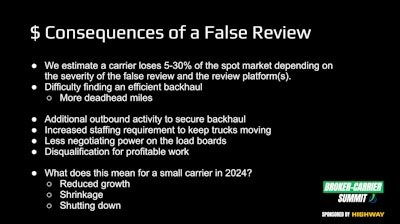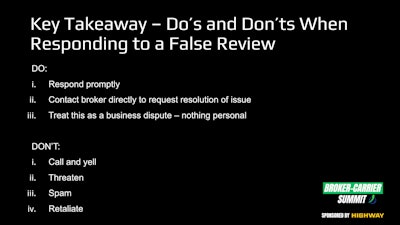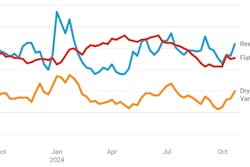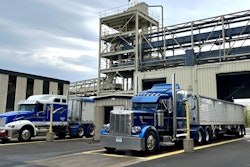Bad online reviews for trucking companies aren't like a bad Yelp review for a McDonald's -- they represent a major threat to any trucking company, particularly those working with brokerages large or small. In the most egregious cases, bad actors can threaten bad reviews for the purpose of blackmail or extortion, even. Recent changes on the Carrier411 platform making its well-known FreightGuard reports about carriers un-deletable after 72 hours really up the ante on how quickly you need to move to mitigate the damage.
Now more than ever, managing bad reviews on online platforms has become a do-or-die task, yet another hat for independent owner-operators to wear. A recent talk at the Broker-Carrier Summit in Fort Worth, Texas, "The Impact of False Online Reviews In Trucking," laid out expert opinions on ways to avoid bad reviews, and contain the damage when they happen.
Sean Mathews, founder of carrier reputation management company Carrier Defender, described a typical false-FreightGuard situation and how it can impact a motor carrier who has done nothing more than haul a load for a broker that turned out not to be the original broker.
"The innocent carrier who actually pulled the load, who thought the double broker was the original broker," quite often "they're going to get a review on their MC number," Mathews said. "They followed instructions, did the paperwork, but at the end of the day, they're going to have a review on their MC."
Mathews then showed some email exchanges between carriers and brokers following double brokering situations that in fact led to a FreightGuard review posted.
One broker decided to play hardball. "The only way I will take down a report is if the carrier recovers our freight or pays for the material," the broker wrote a carrier who had hauled a load for a double broker. The load ended up stolen by cargo thieves, and now a broker with less than one year of authority wanted answers from a 25-truck carrier that stood ready to transparently assist with any investigations or inquiries. Mathews said in this case, that material cost about $60,000. "The trucking company doesn't have those funds just to get a review removed when they're innocent," outside of making an honest mistake in not getting a bill of lading signed.
"The broker didn't even introduce the carrier to the shipper to maximize the chance of recovering the stolen cargo," Mathews later clarified. "They wanted to control the narrative and 'not look bad.'"
Mathews, formerly a broker himself, said that even perfectly legal and justified actions from carriers can lead to a FreightGuard report, including brokers "retaliating for requesting fair compensation for layover."
 This, and the other slides in this article, came from the session at BCS hosted by Mathews and Artaev.
This, and the other slides in this article, came from the session at BCS hosted by Mathews and Artaev.
"We all know with some brokers out there, you better give up chasing that detention because that broker is in a permanent meeting all week and they don't answer calls for detention or layover," he said. A "spiteful broker with a grudge," or simply a cheap one, might threaten or actually carry out a FreightGuard review bashing the carrier.
Add to the mix that there's new, untrained brokers; unethical brokers; and straight-up "scumbag" brokers that might threaten a FreightGuard to extort cash from a carrier, and it's easy to see how Mathews stays busy consulting carriers on how to protect their reputation in a real "carrier vetting" minefield.
[Related: Brokers' new 'carrier vetting' craze bad for trucking, carriers say]
"We've seen some cases of actual blackmail on review platforms," said Mathews. "Literally yesterday I got an email from a carrier who is being told he needs to pay $1,000 a month or someone is going to put a FreightGuard on him. The reason is, they can."
Joining Mathews during the talk was Detroit-based attorney Dan Artaev. Both men stressed this problem -- false reviews damaging carrier businesses with no blowback for brokers -- represented a key mission for the Broker-Carrier Summit event itself, educating brokers and carriers both on how to navigate these tricky situations. Responsible brokers should care about the issue, Artaev emphasized. He partnered with Mathews on the Carrier Defender service originally to help carriers avoid reputational damage, but he also hopes word spreads among brokers that they need strong processes in place to prevent false reviews going up in the first place.
 Sean Mathews (left) and Dan Artaev
Sean Mathews (left) and Dan Artaev
Sometimes the brokers simply don't realize the full import of reviews they're leaving for a carrier, and/or carriers don't understand how important a clean rep really is. Mathews said it's "ridiculously hard" in this market for carriers to land freight with a bad review, and that in these days of loose capacity, nobody seeks their boss' approval to get past a yellow flag on a vetting platform like Carrier411.
Results can choke whatever profit margin remain for a trucking business hoping to survive the down cycle.

"We estimate a carrier loses 5%-30% of the load board capacity" from a bad review online, said Mathews, referencing the range of available loads that the carrier simply won't have access to after a bad review. "It depends on how serious the review is, and the platform it was left on, but some brokers will hit you on every single platform."
More deadhead miles, less leverage with brokers in negotiations, losing out on the best brokerages: all outcomes frequently follow the bad reviews, he added.
Artaev has taken these false reviews to court and won, sometimes extracting punitive damages in the hundreds of thousands of dollars, but warned that litigation represents a "no win" situation, as detailed below.
How to fight back against a bad review of your trucking company
In the event of a bad review, either pending or actual, first find out where exactly the review is and try to get a screenshot, said Mathews. Once you know what broker and what platform to approach, "explain the situation as professionally as you can, without emotions. Honestly that's one of the things we see carriers having the most difficulty doing... going out there on the phone and just saying it's fake, the broker was a jerk." That "just doesn't work."
In the case of Carrier411's FreightGuards, a carrier gets notified via their FMCSA-registered email as soon as the review gets submitted, and then the carrier and reporting broker have 72 hours to figure something out before the report becomes "permanent" and un-deletable. It's a good idea to check that FMCSA-registered email's inbox often when working with brokers on the spot market.
Next, Artaev said, "take control of the situation. There are some very, very critical dos and don'ts, which are pretty much common sense. You have to respond promptly if you have the chance to respond. ... Don't threaten, don't spam, don't retaliate. That might expose you to legal risk, as defamation goes both ways."
Luckily, he added, if carriers "treat this as a business dispute and take the emotions out of there and see what kind of solution you can come up with," not limited to "money changing hands," the disputes often get resolved.

Sometimes, though, parties just can't agree. Legal action then follows.
Artaev showed how he's seen that typically play out; "First, a cease-and-desist letter notifying the broker that we have reason to believe you’re liable for this posting, here’s why it’s false, here’s the evidence we have." If that "goes nowhere" then the process starts for litigation.
The carrier's legal counsel "starts drafting a complaint" with evidence of defamation, which is a false statement that causes damage to a business's reputation.
Artaev said damage to business reputations is "specifically presumed to have caused damages" in legal precedents, so even if there's not an exact dollar amount, like a canceled contract, "you can claim damages."
The broker must engage their own attorney to defend themselves. Despite court cases costing a fortune for uncertain outcomes, this is where the carrier gets their shot at proving something once and for all.
"The defense to defamatory statements is truth," said Artaev. Basically, if what the broker says is true, it's likely to stand in court. If not, the broker might be liable. "It could be a matter of months or a matter of years, and this gets very expensive. To take something all the way to a verdict, be prepared to spend $20,000, $30,000 or $40,000 on lawyer fees."
And after all that money spent you still might not win a judgement -- the absolutely "devastating thing about this," according to Artaev. Attorney's fees aren't recoverable (the judge likely won't order the broker to pay your lawyer), and who knows if you can even collect the money? A lot of the "fly by night" brokers he sees leveraging false FreightGuards and other reviews probably won't pony up in the end, Artaev suggested.
[Related: OOIDA calls out Carrier411 enabling brokers 'blackballing motor carriers on hearsay']
More from the Broker-Carrier Summit:
**Inside the broker-carrier scrum at last week's summit
**How to beat brokers at their own game and win direct freight
**FMCSA gets an earful about bad brokers, enforcement from its 'worst critic'










